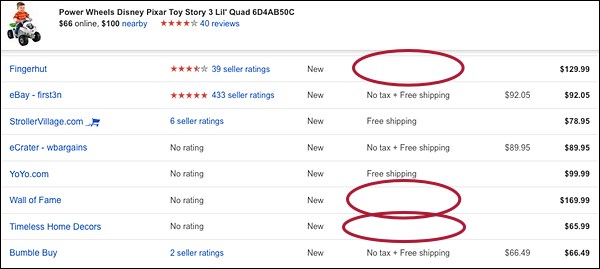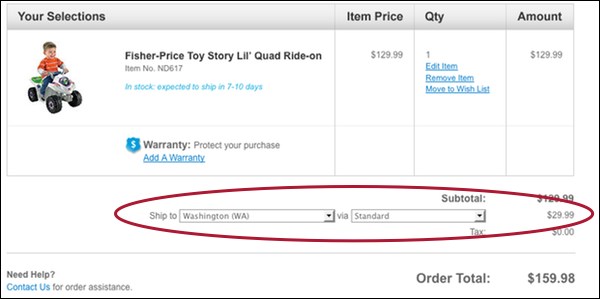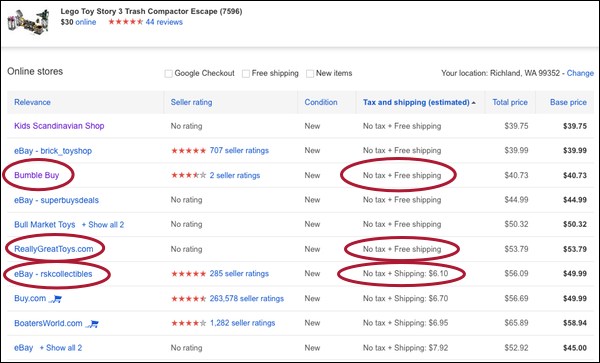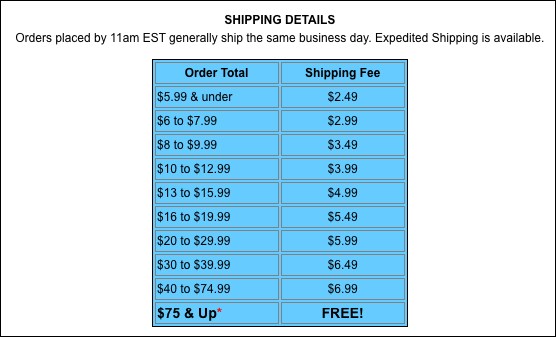Despite New Rules, Google Product Search Merchants Not Providing Accurate Tax & Shipping Costs
Shoppers using Google Product Search are sometimes being misled by incorrect tax and shipping information in search results. And that’s despite Google’s recent crackdown on merchants who either omit tax and shipping details, or list false/incorrect data in their product feeds. Back on March 14th, Google announced new rules for Product Search merchants. Among those […]
Shoppers using Google Product Search are sometimes being misled by incorrect tax and shipping information in search results. And that’s despite Google’s recent crackdown on merchants who either omit tax and shipping details, or list false/incorrect data in their product feeds.
Back on March 14th, Google announced new rules for Product Search merchants. Among those new rules were requirements that merchants include tax and shipping costs in their product feeds. The original deadline for this was June 6th, but on June 1st Google extended the deadline until September 1st.
Now, more than two months later, and with the holiday shopping season right in front of us, many merchants are still leaving out tax and shipping costs and/or including false or incorrect costs.
Examples: Merchants Not Including Tax & Shipping
Consider this search for a Toy Story Power Wheels toy.
Three of the 21 merchants haven’t included tax and shipping costs: Fingerhut, Wall Of Fame and Timeless Home Decors. Google searchers would probably like to know that all three do have shipping charges, ranging from $11.32 at Timeless Home Decors to $29.99 at Fingerhut.
Despite Google’s rules, this doesn’t appear to be an isolated case. On a search for this Seattle Mariners comforter set, eight out of 26 merchants aren’t showing tax and shipping costs. One out of 13 merchants selling this Sony DVD player doesn’t list tax and shipping costs. Seven out of 28 merchants selling this Epson printer don’t show tax and shipping costs. There are 23 merchants selling this indoor heater, but only 11 of them show tax and shipping costs.
You get the picture.
Examples: Merchants Showing False/Incorrect Tax & Shipping
As poor as the user experience is when searchers can’t see tax and shipping costs, it’s worse when the tax and shipping costs shown in Google Product Search are wrong.
Consider this search for a Toy Story Lego product.
The eBay seller “rskcollectibles” lists shipping as $6.10, but when I go to buy the item, that price applies to buyers near the sellers’ location. For me, shipping to Washington state is just under $12 — about double what shows in Google Product Search.
Right above that eBay seller is ReallyGreatToys.com, which lists free shipping and no tax in Google Product Search. But that’s not accurate. Click through to the website and searchers will discover that shipping is only free on orders above $75. Since this toy is about $54, shipping is actually $6.99.
Further up the page, the “Bumble Buy” listing also lists free tax and shipping, but when I click through to their web site (which requires registering a new account if I want to even begin the ordering process), I’m told that there actually will be shipping costs.
It gets worse because, if I click beyond this page, Bumble Buy sends me to Amazon.com to buy the item where, okay, shipping is free because the item costs more than $25. But, as a Washington resident, I have to pay tax — and that’s not what Bumble Buy indicated in Google Product Search. (And really Google, what’s with allowing Amazon affiliates to have listings in Google Product Search? I’m not too thrilled about the fact that I just registered an account on a shell website that sends me to Amazon to actually buy stuff.)
Andrew Davis highlighted the misinformation and lack of rule enforcement last month on his blog, and followed it up with another article on Search Engine Watch. He makes the case that merchants that are breaking Google’s rules are getting additional traffic and conversions from shoppers looking for free tax and shipping, while merchants that play by Google’s rules are suffering.
What Does Google Say?
We asked Google about its enforcement of the merchant rules that went into effect on September 1st and a company spokesperson says Google is now enforcing all of the merchant feed requirements.
“Merchants have been getting notifications for errors/data problems” since September 22, the spokesperson says. Google also says it’s telling merchants how quickly they need to fix “egregious violations” — things that could result in having their merchant accounts suspended.
“In general,” the spokesperson says, “we’re asking merchants to fix issues as quickly as possible, to prevent penalties like suspension of their account and ensure the best possible experience for users.”
Google may be asking, but it’s clear that, in many cases, merchants either aren’t listening or they’re not acting very quickly to fix their feed violations. And in the meantime, searchers continue to be misled by some the data and search results they find in Google Product Search.
Happy holidays? Not likely for some shoppers.
(Note: Due to the nature of product feeds and shopping search, some actual searches and search results may look different when you read this than they did when the article was being written.)
Contributing authors are invited to create content for Search Engine Land and are chosen for their expertise and contribution to the search community. Our contributors work under the oversight of the editorial staff and contributions are checked for quality and relevance to our readers. The opinions they express are their own.
Related stories
New on Search Engine Land






